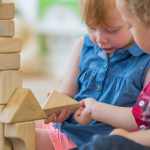
Perinatal Mental Health Week: It’s more common than you think
Early childhood educators have an important role in the lives of children, families and communities. Supporting families with mental health issues is complex, and an educator’s role in this sphere is not always well defined. One important way educators can offer support is by forming respectful and authentic partnerships with families and being aware of referral pathways where families can access information, if and when it is needed.
Perinatal Anxiety and Depression Australia (PANDA) has been supporting families with perinatal mental health issues for over 35 years. Each year, there are over 100,000 families in Australia that are impacted by Perinatal Depression and/or Anxiety. This week (8–14 November 2021) is Perinatal Mental Health Week and ECA is helping spread awareness and acknowledgement of the challenges and complex nature of living with Perinatal Depression and Anxiety.
We caught up with the team at PANDA to find out more about the week and further information, context and resources for early childhood educators to be aware of when supporting families and children in your service.
Early Childhood Australia (ECA): Can you tell us a little bit about the significance of this year’s theme, ‘breaking down barriers’?
Perinatal Anxiety and Depression Australia (PANDA): We are focussing on breaking down barriers this year because we know there are still some significant barriers for new and expecting parents to overcome to reach out for help. We’re focussing on language, lack of awareness, location, fear of judgement, access to healthcare professionals and providing tangible resources.
ECA: Why do you think it’s important for early childhood professionals to be aware of Perinatal Anxiety and Depression?
PANDA: In the last 12 months, 75 per cent of callers to PANDA’s National Perinatal Anxiety & Depression Helpline were currently pregnant with their second or third child. Often this means that older children are in early childhood services. It’s important for early childhood professionals to be aware that many expecting or new parents may be experiencing perinatal mental health issues. Having information available can support parents and families through pregnancy and in the first 12 months after birth.
ECA: What are some of the signs or symptoms of Perinatal Anxiety and Depression?
PANDA: When anxiety or depression occurs during pregnancy, it is referred to as antenatal anxiety or antenatal depression. Up to one in 10 women and one in 20 men experience antenatal depression. Anxiety is even more common, and many parents experience anxiety and depression at the same time.
Anxiety and depression can be mild, moderate or severe, and symptoms can begin anytime during pregnancy or after birth, or appear gradually in the weeks or months during the first year after birth. The severity of anxiety and depression depends on the number of symptoms, their intensity and the extent to which they interfere with getting on with day-to-day life.
The combination and severity of symptoms will be different for every parent but might include panic attacks, persistent generalised worry, the development of obsessive or compulsive thoughts and/or behaviours, abrupt mood swings, feeling constantly sad or low, crying for no obvious reason, having thoughts of harming your baby or having thoughts of death or suicide.
It should be noted that perinatal anxiety and depression are experienced by both mums/birth parents and by dads and other non-birth parents, for example in LGBTIQ+ parent families.
ECA: Can you suggest ways early childhood professionals can support a family that is experiencing Perinatal Anxiety and Depression?
PANDA: Focus on providing practical help and gentle emotional support. If you know the family well, you may feel comfortable encouraging them to open up to their GP, midwife, obstetrician or child health nurse—or to call PANDA’s National Perinatal Anxiety & Depression Helpline, 1300 726 306. You can help normalise the conversation by having resources available and talking about perinatal anxiety and depression as a common and serious illness that can affect any individual and their family, regardless of culture or age.
PANDA provides a number of education resources for families, including posters, brochures and fact sheets you could make available in your service foyer or elsewhere. Many are available in community languages. You can download or order resources on the PANDA website.
If your service is keen to highlight this issue, you could also consider hosting a PANDA Day.
ECA: What referral pathways are available for families with Perinatal Anxiety and Depression?
PANDA: The PANDA Helpline can provide skilled counselling support as well as information and referral to other services in your area. This includes local medical services, mental health services and family services. Helpline counsellors can connect families with these services and discuss what kind of supports might be right for them.
Playgroups and supported playgroups can be a great support for some families. Isolation is a common factor for many who experience perinatal mental health issues. Find playgroups via the PANDA Helpline or your state playgroup association; families can also often be referred to playgroups through local council services.
Conclusion
A key challenge in perinatal mental health is that many families will struggle for weeks, months or longer without support. Early childhood educators can make a real difference by noticing when a family is struggling, normalising conversations about parent emotional and mental wellbeing, and providing a bridge for families to get the help they need.
For more information and training, check out PANDA’s free online courses. These focus on practical skills and language tips. Access them via PANDA’s Learning Hub, or sign up to PANDA’s eNews for training and resource updates.










